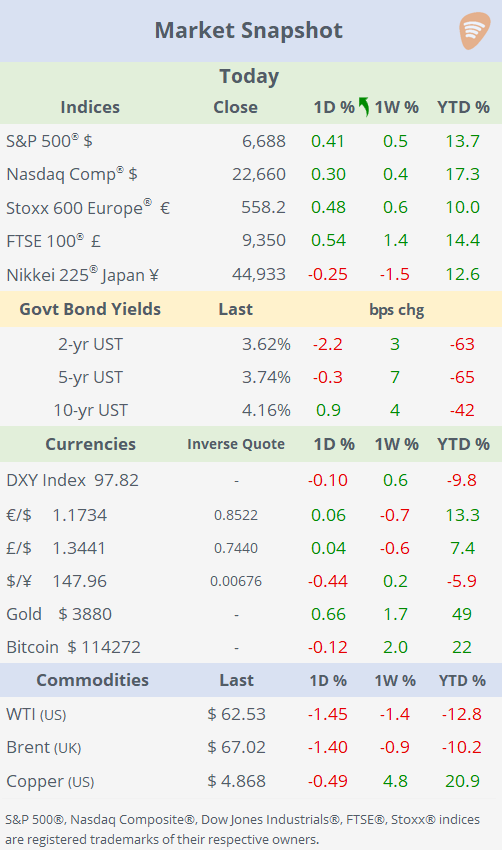Tue 30 Sep: After the Bell
🎙️📄+ Market Data
See the ‘Market Data’ post.
Good evening,
US stock indices spent much of Tuesday in the red but rallied late to close higher despite the looming government shutdown risk and weak consumer confidence data. Pfizer led gains with a 7% jump after announcing a drug pricing deal with Washington, boosting healthcare stocks. Crude oil extended Monday’s steep losses, dropping another 1.5% amid ongoing uncertainty regarding OPEC’s next move.
September capped off a strong quarter for markets with the S&P 500 gaining 3.5% in the month and 8% in Q3, powered by tech sector strength, while consumer staples lagged. European stocks also advanced but underperformed, rising just ~1% in September and 3% in Q3. The dollar index was flat over both periods. Gold rallied sharply, up 13% in September and 17% on the quarter, while 10-year Treasury yields fell modestly by 5bp this month and 7bp in the quarter. Bitcoin was steady, rising about 5% in both periods. Overall, risk-on sentiment prevailed, driven by expectations of ongoing Fed rate cuts, robust corporate earnings, and a strong dealmaking environment.
Politics, the US government is likely to shut down at midnight as no last-minute deal has emerged, with Republicans and Democrats deadlocked over a stopgap funding bill.
Geopolitics, Trump gave Hamas “three or four days” to accept his Gaza peace plan or face “a very sad end,” while Netanyahu said he did not agree to Palestinian statehood and Israel would stay in most Gaza territory.
Monetary Policy: The Reserve Bank of Australia kept rates steady at 3.6% as anticipated, following three reductions this year, signalling caution amid signs inflation may be higher than expected, and the economic outlook remains uncertain. The Aussie dollar appreciated 0.6% today to accumulate a 7% gain against the $ YTD.
Economics: It was an active day for data in the US and abroad. JOLTS job openings in August came in at ~7.23mn, up modestly from July, a signal of a cooling labour market as hiring fell and quits declined. US consumer confidence tumbled to 94.2 in September (from 97.8), the lowest since April, driven by growing pessimism about jobs and business conditions.
German consumer prices (HICP) rose 2.4% YoY in September, marking their highest rate since February and showing an acceleration from 2.1% in August, driven notably by a rise in services inflation despite falling energy prices. French inflation stood at 1.1%, maintaining a relatively low inflation pace, and Italy’s inflation came in at 1.8%, showing a moderate increase indicative of stable but persistent inflation.
UK GDP grew 1.4% YoY in the final Q2 reading, revised higher from 1.2%, marking continued moderate growth supported by resilient government spending and export rebounds, consistent with expectations, and signalling stable economic momentum.
China’s official NBS manufacturing PMI rose modestly to 49.8 in September from 49.4 in the prior month, marking the sixth consecutive month of contraction, but at the slowest pace.
Japan’s retail sales fell 1.1% YoY, marking the biggest drop in four years, driven lower by weak wages and higher costs. Industrial production declined 1.3% YoY, missing forecasts as factory output fell for the second month amid global trade pressures, signalling economic caution. These weak figures suggest a fragile consumption rebound and manufacturing slump that complicate the Bank of Japan’s efforts to balance stimulus with inflation control.
Deals: Cloud-computing company CoreWeave (mcap $66bn) secured a $14bn (sales) deal with Meta to provide cloud infrastructure, underscoring surging demand for AI processing power amid rapid AI technology growth. CoreWeave shares jumped 12% today and are 240% higher than their IPO price in March.
Global M&A deal value topped $1tn in Q3 for only the second time ever, driven by a record number of megadeals, including yesterday’s $55bn LBO of Electronic Arts, making this year the most active for dealmaking since 2021. Although the overall deal count is lower, strong corporate demand is driving a clear shift toward larger megadeals.
IPOs: There were no significant listings (ex-ETF and SPACs) on US, UK, or European exchanges today. London has fallen out of the world’s top 20 IPO markets for the first time in over 35 years, slipping to 23rd place behind Mexico, Singapore, and even Oman, as IPO fundraising volumes collapsed 70% YTD to just $250mn, signalling a significant decline in its status as a global financial hub.
Day ahead: €-zone inflation; US and EU manufacturing PMIs; India’s central bank rate meeting.
See you tomorrow.
Copyright © 2025 Succinct.
All rights reserved. This publication contains proprietary content and is intended solely for the recipient’s personal use. Disclaimer: Our service is for informational purposes only and does not constitute personal financial advice.



